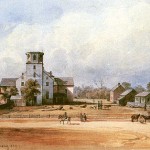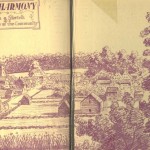If Robert Owen had his way, the Indiana countryside might now be dotted with walled communities where people lived according to his guidelines for a “new moral world.”
Owen came to the United States from Scotland in 1824. He bought the Posey County Village of Harmony, which was founded in 1814 by a group known as the Harmonists. Led by Johann Georg Rapp, the Harmonists had created a type of Utopian village based on a strong work ethic and prayer.
Owen had different ideas for his utopia, and renamed the town New Harmony. He hoped to build an enclosed, one mile square village in which people would live according to his views. Owen believed that religion, traditional family values, and the concept of private property stood in the way of achieving true equality in society.
Misunderstandings about Owen’s ideas, and the fact that Owen was often absent, left the community without strong leadership. The experiment failed within 3 years and his utopian community was never realized.





















